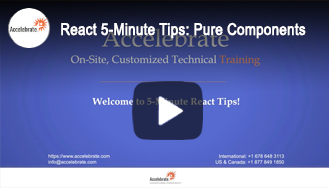React and TypeScript Training Overview
React is a JavaScript library for building web user interfaces and is one of the most wanted and loved web frameworks today. React makes it painless to create interactive UIs on top of web standards.
In this Introduction to React using TypeScript training course, students will gain hands-on experience with the latest version of React and the tools for developing React applications. Developers learn the skills they need to immediately build React applications using the TypeScript language.
Note: This React class can also be taught using JavaScript/ECMAScript.
Location and Pricing
Accelebrate offers instructor-led enterprise training for groups of 3 or more online or at your site. Most Accelebrate classes can be flexibly scheduled for your group, including delivery in half-day segments across a week or set of weeks. To receive a customized proposal and price quote for private corporate training on-site or online, please contact us.
In addition, some courses are available as live, instructor-led training from one of our partners.
Objectives
- Use a JavaScript package manager (either npm or Yarn)
- Understand the new JavaScript language features, including classes, modules, and arrow functions
- Use TypeScript to enable additional language features including static typing and generics
- Articulate what React is and why it is useful
- Explore the basic architecture of a React application
- Gain a deep understanding of JSX and the Virtual DOM
- Use React components to build interactive interfaces
- Create and validate forms using controlled components
- Make HTTP calls to read or change data
- Explore the common component architecture patterns
- Configure simple and complex routing
- Learn React best practices
Prerequisites
Students must have object-oriented programming experience. Some experience with JavaScript is helpful; the new language features of JavaScript and TypeScript are covered/reviewed in class.
Outline
Expand All | Collapse All
Introduction
Package Manager (npm/Yarn)
- npm
- What is Node.js?
- What is npm?
- Using npm
- npm Scripts
- Yarn
- Why Yarn?
- npm vs. Yarn
- Installation
- Using Yarn
Compiler Setup
- Setup TypeScript Compiler (tsc)
ES6/ES2015
- Classes
- Scope (var, let, const)
- Arrow Functions
- Modules
- Template Literals
- Default, Rest, Spread
- Default
- Rest
- Spread
- Destructuring
- Optional Parameters
- Object.assign()
- Object Initializer
TypeScript
- Understanding TypeScript, ES6, and ES5
- How TypeScript Works
- Who is Behind TypeScript?
- Type Annotations
- Classes
- Fields
- Parameter Properties
- Member visibility (public, private, protected)
- Automatically Import Modules
- Nullable Parameters
- Interfaces
Project Setup (Create React App)
- Create new Project
- Folder Structure
- Browser Support
- Styles and Assets
- Dependencies
Best Practices (Code Organization & Conventions)
React Overview
- Why React?
- What it is?
- Why it is useful?
- Angular, React Compared
- Web application architectures
- Server-side web application architecture
- Single-page web application architecture
- React Architecture
Elements
- Hello World in JavaScript
- Hello World in React
JSX
- Replacing createElement
- Embedding Expressions
- Specifying Attributes
Virtual DOM
Components
- Creating an Element
- Create a Function Component
- Rendering a Component
- Creating a Class Component
- Composing & Reuse
Props
- Read-only
- String Literals vs. Expressions
- Function vs. Class Components
Events
- Listening/Subscribing/Wiring to an Event
- In Vanilla JavaScript
- In React: Function Component
- In React: Class Component
- Binding
- Why Binding is Necessary?
- Class Method
- Arrow Function
- Passing Parameters
- Using Arrow Functions
- Using Bind
- Handling Events
- Using Arrow Functions
- Using Bind
- Synthetic Events
Hooks
- Definition
- Why Hooks?
- No Breaking Changes
- Hooks API: useState, useEffect, useRef, useContext
- Rules of Hooks
State
- Definition
- State in Function Components
- useState Hook
- State in Class Components
- Mutating state with setState
- Using State Correctly
- Data Flows Down
Side Effects & Lifecycle
- useEffect Hook
- What does useEffect do?
- Using useEffect
- useEffect Demo
- What are Lifecycle Methods
- Understanding Mounting
- Common vs. Less Common Methods
- Using Lifecycle Methods
React with TypeScript
- Installation/Setup
- Props Interfaces
- State Interfaces
- Typing Event Handlers
Conditional Rendering
- If, else
- Conditional Operator (?)
- Logical (&&) Operator
Lists
- In Vanilla JavaScript: for loop, array.forEach, array.map
- In React: using Elements, Components
- Why Keys are Needed
Component Architecture
- Reuse
- Component Communication
- Design Patterns
- Container and Presentation Components
- Composition vs. Inheritance
Forms
- Controlled Components
- Reuse of Change Logic across Multiple Inputs
- Handling Form Submission
- Controlling Other Form Elements: select, textarea, number
- Validation
- Uncontrolled Components
HTTP
- Axios library
- Fetch API
- Using with React (HTTP GET)
- Refactoring for Reuse
- HTTP POST, PUT, DELETE
Routing (React Router)
- Installation
- Basics
- Handling Not Found (404) (as time permits)
- Parameters (Url & Query) (as time permits)
- Nesting (as time permits)
Hooks
- Defined
- Why Hooks?
- No Breaking API Changes
- Hooks API
- useState
- useEffect
- Custom Hooks
- Rules of Hooks
Build & Deploy (as time permits)
- Building a React Application for Production
- Deploying a React Application
- Serving Apps with Client-Side Routing
- Customizing Environment Variables
Conclusion
Training Materials
All React training attendees receive comprehensive courseware.
Software Requirements
- Google Chrome and/or Firefox
- Other modern browsers as desired
- IDE/development environment of your choice
- Other free software and lab files that Accelebrate would specify, including Node.js


